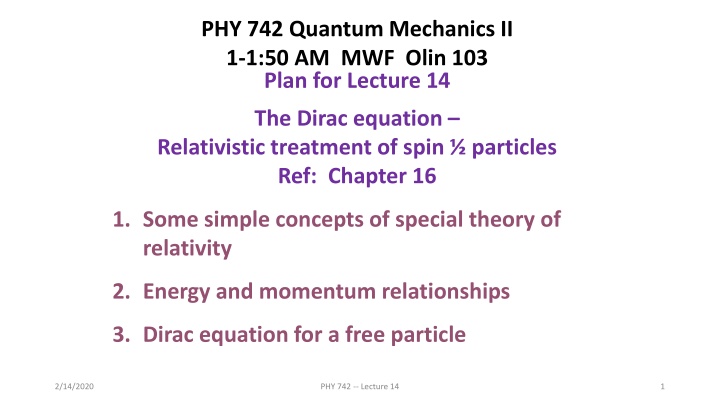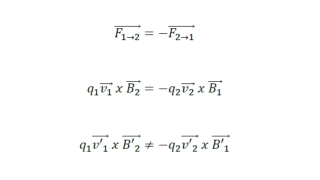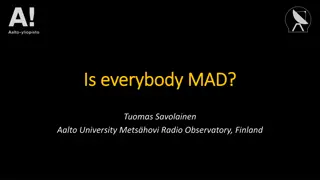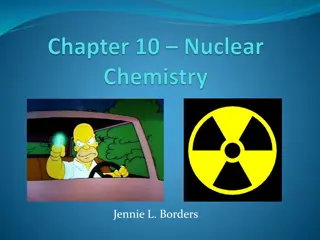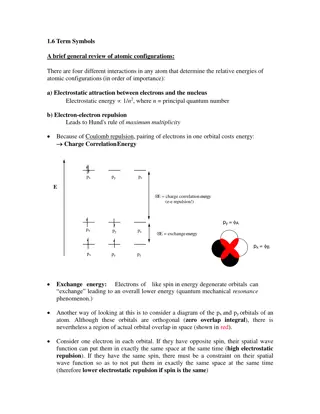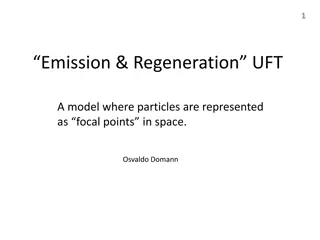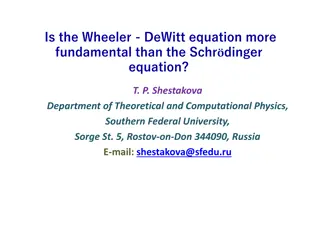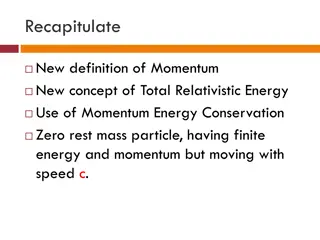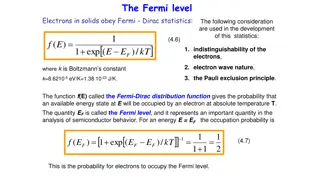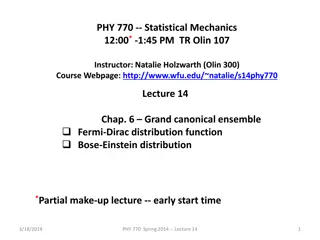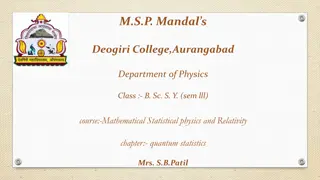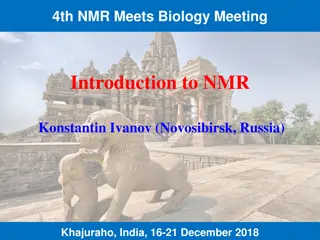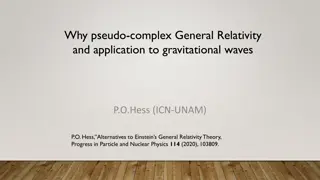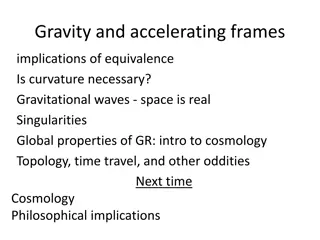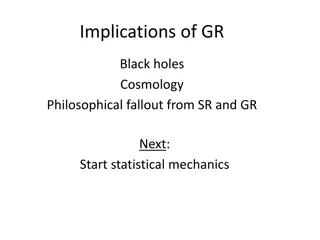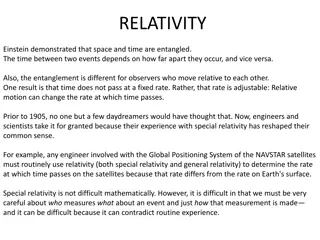Relativistic Treatment of Spin Particles: Dirac Equation & Special Relativity
Exploring the Dirac equation for spin particles within the framework of special theory of relativity. Topics covered include energy-momentum relationships, basics of special relativity, Lorentz transformations, and relativistic effects on particles. The lecture delves into the interplay between quantum mechanics and relativistic physics, shedding light on the behavior of particles at high speeds.
Download Presentation

Please find below an Image/Link to download the presentation.
The content on the website is provided AS IS for your information and personal use only. It may not be sold, licensed, or shared on other websites without obtaining consent from the author.If you encounter any issues during the download, it is possible that the publisher has removed the file from their server.
You are allowed to download the files provided on this website for personal or commercial use, subject to the condition that they are used lawfully. All files are the property of their respective owners.
The content on the website is provided AS IS for your information and personal use only. It may not be sold, licensed, or shared on other websites without obtaining consent from the author.
E N D
Presentation Transcript
PHY 742 Quantum Mechanics II 1-1:50 AM MWF Olin 103 Plan for Lecture 14 The Dirac equation Relativistic treatment of spin particles Ref: Chapter 16 1. Some simple concepts of special theory of relativity 2. Energy and momentum relationships 3. Dirac equation for a free particle 2/14/2020 PHY 742 -- Lecture 14 1
Topics for Quantum Mechanics II Single particle analysis Single particle interacting with electromagnetic fields EC Chap. 9 Scattering of a particle from a spherical potential EC Chap. 14 More time independent perturbation methods EC Chap. 12, 13 Single electron states of a multi-well potential Time dependent perturbation methods EC Chap. 15 Relativistic effects and the Dirac Equation EC Chap. 16 Path integral formalism (Feynman) EC Chap. 11.C molecules and solids EC Chap. 2,6 Multiple particle analysis Quantization of the electromagnetic fields EC Chap. 17 Photons and atoms EC Chap. 18 Multi particle systems; Bose and Fermi particles EC Chap. 10 Multi electron atoms and materials Hartree-Fock approximation Density functional approximation 2/14/2020 PHY 742 -- Lecture 14 2
2/14/2020 PHY 742 -- Lecture 14 3
Notions of special relativity Notions of special relativity The basic laws of physics are the same in all frames of reference (at rest or moving at constant velocity). The speed of light in vacuum c is the same in all frames of reference. y y v x x y x x y x x 2/14/2020 PHY 742 -- Lecture 14 4
Convenient v notation : Lorentz transformations c 1 2 1 Stationary frame Moving ct + frame y y ( x ) = + ' ' ct x ( ' ) = x ' ' ct v = y y x = ' z z x y x x y x x 2/14/2020 PHY 742 -- Lecture 14 5
1 v c Lorentz transformations -- continued 2 1 = v : v x For the moving frame with 0 0 0 0 0 0 0 0 = = 1 - L L 0 0 1 0 0 0 1 0 0 0 0 1 0 0 0 1 ' ' ct ct ct ct ' ' x x x x = = 1 - L L ' ' y y y y ' ' z z z z Notice : = 2 2 2 2 2 2 2 2 2 2 ' ' ' ' c t x y z c t x y z 2/14/2020 PHY 742 -- Lecture 14 6
Lorentz transformation of the velocity -- continued frame Stationary Moving frame ( ) = + ' ' cdt cdt dx ( ) = + dx dx' cdt' = dy dy' = dz dx dz' dy dz Define : u u u x y z dt dt dt ' ' ' dx dy dz ( ( dt ' ' ' u u u x y z ' ' ' dt dt v / dt ) ) + ' + ' u dx dx' cdt' / ' = = = x u x + ' + 2 1 dt dx c vu c x ' u ' dy dy + ' y = = = u ( 1 ) ( ) y + 2 / ' ' / dt dt dx c vu c x 2/14/2020 PHY 742 -- Lecture 14 7
Summary of velocity relationships + ' u v = x u x + 2 1 ' / x u vu vu c ' ' u vu + y y = u ( ) ( ) y + 2 2 1 ' / x 1 ' / x c c v ' ' u vu u vu = z z u ( ) ( ) z + + 2 2 1 ' / x 1 ' / x c c v 2/14/2020 PHY 742 -- Lecture 14 8
Example of velocity variation with (u x/c=u y/c=0.5) ux/c uy/c 2/14/2020 PHY 742 -- Lecture 14 9
Velocity transformations continued: ' Consider: 1 vu + ' u vu + + ' u v u vu y = = = . x z u u u ( ) ( ) x y z 2 + ' / x 2 2 c 1 ' / x 1 ' / x c c v v + 2 1 ' / x 1 vu c ( ) = = + 2 Note that 1 ' / x vu c ' u v u ( ) ( ) ( ) 2 2 2 1 / 1 '/ 1 / u c u c v c ( ) = = = = + ' c c v u u v + ' ' u v u u ' y x ( u ) ( ) = + v u c ' ' u u ' c u u u ' ' ' ' u x v u x u v u u x u u ' ' u y u u z u z c ' u u u u u ' ' ' ' u x u x = L Velocity 4-vector: u ' u y u y PHY 742 -- Lecture 14 ' u z u z 2/14/2020 10
Some details: 2 2 2 2 ' u c v v c u c u c ( ) = + = + 2 1 ' / x 1 1 1 1 x vu c ' u v u 2 2 2 2 ' u vu + + ' ' u v u vu y = = = where . x z u u u ( ) ( ) x y z + 2 + 1 ' / x 2 2 vu c 1 ' / x 1 ' / x c c v v 2 u c 2 2 y 2 y ' u c u c 2 x 2 z 2 z 2 ' ' u c u c v u u c v c u c v c + + + = + + + 1 1 x x 2 2 2 2 2 2 2 c 2 2 2 2 2 2 ' u c v u c v u c v c v c + = + + 1 1 1 1 x x 2 2 2 2 2 2 2 2 2 2 ' u c v u c u c v c + = 1 1 1 1 x 2 2 2 2 2/14/2020 PHY 742 -- Lecture 14 11
c u u Significance of 4-velocity vector: u x u u y u u z Introduce the rest mass m of particle characterized by velocity u u: 2 c E mc u u u p c mu c u x x = = u x mc u p c mu c u y y u y u p c mu c u z z u z Properties of energy-moment 4-vector: ' ' E E E E ' ' p c p c p c p c x x x x = = = 1 2 2 2 2 2 2 - L L Note : ' ' E p c E p c ' ' p c p c p c p c y y y y ' ' p c p c p c p c z z z z 2/14/2020 PHY 742 -- Lecture 14 12
Properties of Energy-momentum 4-vector -- continued = c mu c z u 2 E mc u p c mu c x u x p c mu c y u y p z ( 1 ) 2 2 2 2 u ( ) 2 u mc u 2 0, y = = = 2 2 2 2 2 2 2 Note : 1 ' ' x z E p c mc E p c 2 c c c E u = 2 p Notion of "rest energy": For mc = + 2 2 2 2 4 2 Define kinetic energy: E E mc p c m c mc K 2 p p = + 2 Non-relativistic limit: If 1, 1 1 E mc K mc mc 2 p 2 m 2/14/2020 PHY 742 -- Lecture 14 13
Summary of relativistic energy relationships = c mu c p z u z 2 E mc u p c mu c x u x p c mu c y u y = + = 2 2 2 4 2 E p c m c mc u 2 2 + = + = 2 2 2 4 2 2 Check : 1 p c m c mc mc u u u = 2 Example electron an for : c E 5 . 0 MeV m = for 200 GeV E = = 5 4 10 u 2 mc 1 1 12 = 1 1 1 3 10 u 2 2 2 u u 2/14/2020 PHY 742 -- Lecture 14 14
How do these relationships effect quantum mechanics? Focusing on treatment of Fermi particles Relativistic mechanics Non-relativistic mechanics 2 p ( ) 2 E = = 2 2 2 c 2 p E mc 2 m (with some licens e) = ) ( = ) 2 ( )( p + p 2 E c E c mc i H t p + p i c i c t t ( ) 2 = 2 mc 2/14/2020 PHY 742 -- Lecture 14 15
Digression on Pauli matrices = + + x y z x y z 0 1 1 0 0 i 1 0 0 i = = = x y z 0 1 1 0 0 1 = = = 2 x 2 y 2 z Note that 1 0 0 1 ( ) 2 = 2 p p 2/14/2020 PHY 742 -- Lecture 14 16
Relativistic relationships continued Ref: J. J. Sakurai, Advanced Quantum Mechanics ( ) 2 p + p = 2 i c i c mc t t + p 2 L L R Let i c mc t Factored equations: + = 2 L R p i c mc t = 2 R L p i c mc t 2/14/2020 PHY 742 -- Lecture 14 17
Relativistic relationships continued Ref: J. J. Sakurai, Advanced Quantum Mechanics Factored equations: + = = 2 L R p i c mc t 2 R L p i c mc t = = + U R L Dirac's rearrangement: L R L U U p i c t = 2 m c p c i L L t 2/14/2020 PHY 742 -- Lecture 14 18
Relativistic relationships continued U U p i c t = 2 mc p c i L L t U = Further rearrangements: L 2 U U p mc p c = i 2 L L t c m c 2 p mc p c = H = 2 c m c i H t 2/14/2020 PHY 742 -- Lecture 14 19
Four component wavefunction of free Fermi particle U mc i = = = + = k 2 U p c = 2 L L t p c mc U U k ( ) ( ) k k r / i iEt Assume e L L k c U L ( ) k k ( ) 2 E k mc c mc L U ( ) k ( ) k 2 E + 2 2 2 c 2 2 4 c E m = + 2 2 c 2 2 4 k E m c 2/14/2020 PHY 742 -- Lecture 14 20
0 1 1 0 0 i 1 0 0 i = = = Pauli matrices: x y z 0 1 k + k ik z x y = k k ik k k x y z c c c c k = = U L L U ( ) k ( ) k ( ) k ( ) k + 2 2 E m E m = + 2 2 c 2 2 4 c k c + k Positive energy solutions: 1 ( ) 0 = E m z z = = U L N N k ( ) k z 2 E mc k m + + c 0 1 2 E c = U L N N ( ) k ( ) k z 2/14/2020 PHY 742 -- Lecture 14 21
0 1 1 0 0 i 1 0 0 i = = = Pauli matrices: x y z 0 1 k + k k ik z x y = k k ik k x y z c c k = = U L L U ( ) k ( ) k ( ) k ( ) k + 2 2 E mc E mc = + 2 2 c 2 2 4 c k Negative energy solutions: E m k c 1 0 z z = = U L N N ( ) k ( ) k z 2 E mc k m + c 0 1 2 E c = = U L N N ( ) k ( ) k z 2/14/2020 PHY 742 -- Lecture 14 22
What does this all mean? Positive energy solutions: = = = + 2 2 c 2 2 4 k E m c 1 0 k c + z = U L N N ( ) k ( ) k z z 2 E mc k m + + c 0 1 = U L N N ( ) k ( ) k 2 E c z 2 2 k + 2 2 k For c m c E mc 2 m 1 0 0 0 = U L N N ( ) k ( ) k 0 1 0 0 = U L N N ( ) k ( ) k 2/14/2020 PHY 742 -- Lecture 14 23
